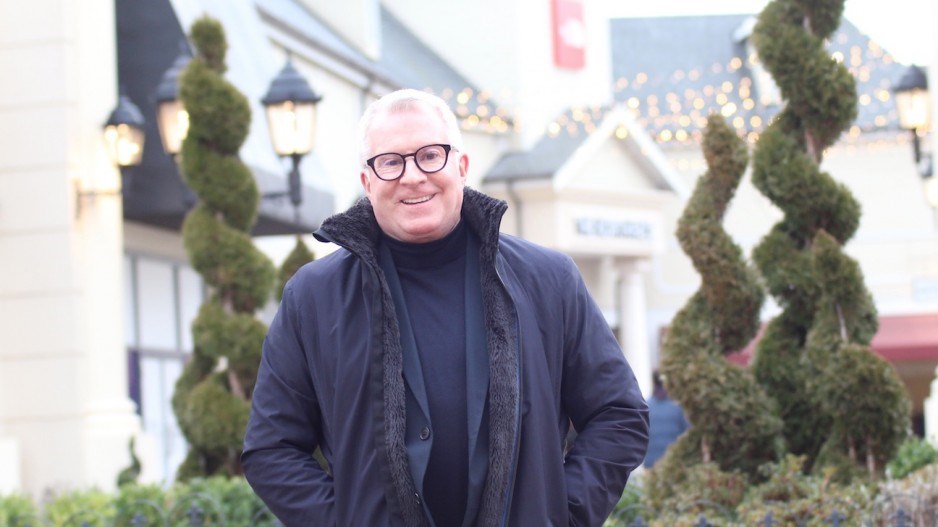Metro Vancouver 's only mall filled exclusively with outlet stores is set to expand.
The McArthurGlen Designer Outlet Vancouver mall in Richmond, near Vancouver International Airport, is preparing to add a 65,000-square-foot third phase to its 324,000-square-foot footprint, the mall's general manager Robert Thurlow told BIV.
The mall's Phase 3 is expected to include between 30 and 35 stores, depending on how much space each tenant wants.
"We don't have a date yet on when construction will start, but I will hopefully be able to announce that within the next quarter," he said.
At 389,000-square-feet when Phase 3 is complete, the mall will remain small compared with the region's largest shopping centres.
BIV last year ranked Metropolis at Metrotown as Metro Vancouver's largest shopping mall, at 1,573,600 square feet. The next largest shopping centres are Park Royal, with about 1.5 million square feet, and Guildford Town Centre with 1,196,451 square feet.
"It's the last patch of land that is currently sitting and waiting to be developed," Thurlow said.
McArthurGlen is a tenant of the Vancouver Airport Authority, which in turn has a revenue-sharing agreement with the Musqueam Indian Band.
"There can always be other ways we can target to develop the centre in future, but the original plan for the centre was to be built in three phases," he added.
Retail analyst and DIG360 owner David Gray told BIV that he thinks McArthurGlen's mall has bounced back faster than many other shopping centres across the region.
"As people came back to malls, out of the pandemic, I don't think every mall property benefited with that return to stores equally," he said.
"I think McArthurGlen was one of the smaller number of malls that did quite well. Part of that is that it is a discount mall. It's a designer mall but it is off-priced and that is well suited to the times right now."
When Thurlow's mall opened in 2015, it had 240,000 square feet of space and was about 65-per-cent filled on opening day. By year-end it was fully leased, he said.
He oversaw an 84,000-square-foot Phase 2 open in September 2019. It was mostly filled, and had more than 30 stores.
Business was brisk until March 2020, when concern about the COVID-19 pandemic prompted the mall to close for about two months, he said.
Thurlow told BIV that his company's rental revenue from its tenants fell by about 30 per cent in 2020, and then climbed back to be about 85 per cent of its 2019 level in 2021.
Many of his retail and hospitality tenants saw more dramatic drops in sales than did Thurlow's firm, as the landlord, but McArthurGlen did feel a pinch, Thurlow confirmed.
McArthurGlen has lease agreements that require tenants to pay a base rent, and then a percentage of sales after tenants' sales reach certain thresholds.
With most tenants having skimpy sales during the depths of the pandemic, McArthurGlen was only able to collect base rents from most merchants, he said.
The vast majority of Thurlow's tenants are multinational companies that were too large to be eligible for the Canadian government's COVID-19-related rent-rebate initiative, Canada Emergency Commercial Rent Assistance Program, Thurlow said.
That program enabled a 50-per-cent government subsidy for tenants to kick in if the landlord agreed to accept only 75-per-cent of a small-business tenant's required rent.
Thurlow called 2022 revenue unexpectedly strong, as it beat what he said were his own "cautiously optimistic" expectations.
The mall's rental revenue last year exceeded money generated in 2019 by about 10 per cent, he said, without revealing exact figures.
His mall's second phase was, however, only open for about one-third of 2019 so equating rental revenue in 2022 to that in 2019 is not an apples-to-apples comparison.
Regardless, seven new stores opened at McArthurGlen in 2022: Castella Cheesecake, Furla, Steve Madden, Karl Lagerfeld, Harry Rosen, Browns and Pandora, Thurlow said.
He expects Versace and Mountain Warehouse to each expand their stores this year, while Oak & Fort and Moose Knuckles each launch new locations, he said.
What makes McArthurGlen's mall different from others is that it is entirely filled with outlet tenants. Tsawwassen Mills, in contrast, has a mix of outlet and non-outlet tenants.
Outlet locations sell different products than the operating brands' main stores. Sometimes brands clear out excess inventory at outlet stores. Other times designer retailers create less expensive clothing lines to sell at their outlet locations.
Discounting is also more common at outlet stores than it is at brands' main stores.
"When we opened the centre, I think what was really interesting was making sure that we had what would be, from a brand-mix point of view, something that would be appealing to everybody," Thurlow said.
That meant having tenants that could please shoppers wanting to buy luxury goods, mid-market products and athletic apparel, as well as a range of foods and drinks.
He also wanted to have brands that had not operated outlet stores anywhere in Western Canada.
"Everything here is an outlet," Thurlow stressed.
"Jimmy Choo is a great example of that. You have your Jimmy Choo full-line store downtown, and then you have your Jimmy Choo outlet with us."
About 25 per cent of McArthurGlen's shoppers arrive on Canada Line, while the rest drive, Thurlow estimated.
He said that the shutdown in air travel during the pandemic prompted him to direct marketing initiatives at Metro Vancouverites who live more than a 30-minute drive away.
"We're starting to see more people, with more frequency, who are coming from New Westminster, Surrey Burnaby and North Vancouver."



